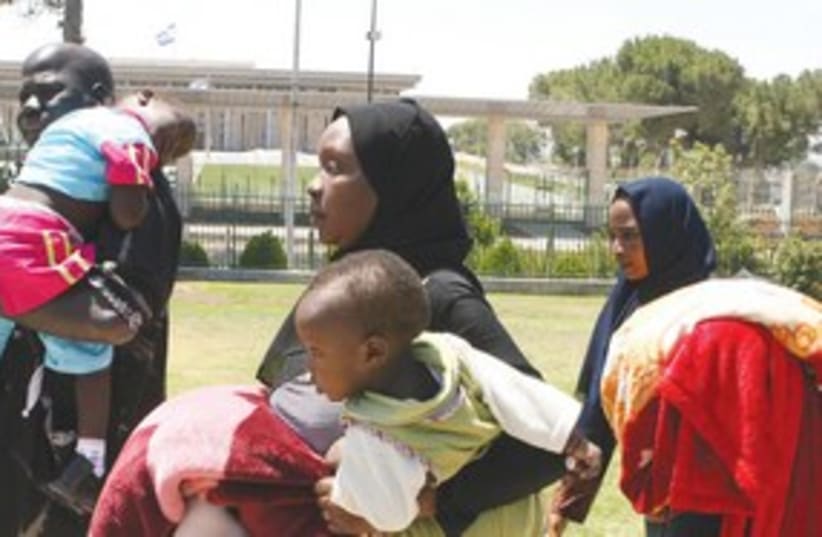RELATED:Ministries warn they can’t cope with Falash Mura influxNew forms for African migrants make working illegal Sharansky: Provide housing now for Ethiopian immigrants However, human rights organizations have compared the planned facility to a ghetto.Initially the facility is planned to be an open one, allowing the migrants to come and go freely, but according to the cabinet decision proposal, once new legislation is passed, it will function as a closed, or semi-closed, facility.A source in the Prime Minister’s Office said that constructing the facility would give the government the legal and moral right to begin taking enforcement measures against employers who hired the African migrants. Though it is illegal for people to employ the migrants, the government has been loath to enforce the laws because it lacked an alternative method of helping them meet their physical needs.Though details about the facility are still vague – for example, it is not yet known whether the migrants will dwell in tents or in permanent buildings, or whether the facility will be surrounded by a physical barrier – the source said it would provide the migrants with everything they needed for a prolonged stay.“These people aren’t terrorists and won’t be treated as such. They will be provided with all their basic needs – food, lodging, health care, education for their families, etc.,” said the source.What is also not yet known is whether migrants who already reside in Israel – an estimated 31,000, with 1,200 more arriving every month – will be required to stay at the facility and whether a concerted effort would be made to round them up. The source said the reasoning was that stringent enforcement against employment would drive the migrants to seek residence there, but added that the facility was being established primarily to absorb newcomers.Other measures taken by the government to stem the tide of incoming migrants are the construction of a physical barrier along the Egyptian border, and attempts by the Foreign Ministry to locate countries willing to absorb the African migrants, either openly or in refugee camps in their territories.A majority of the migrants (85 percent) hail from either Sudan or Eritrea. In both cases, international conventions make it impossible for Israel to send them back. In Israel, those who carry documents proving that they come from either of the two countries receive collective protection, even though the government defines them as economic migrants who come to Israel to improve their quality of life.“Israel is the only developed country that you can reach on foot from the poorest countries in Africa. Many have already done so, and the flow of infiltrators is only growing as the Israeli economy advances and develops,” said Prime Minister Binyamin Netanyahu in a statement.“The phenomenon of infiltrators into Israel endangers the Jewish and democratic character of the State of Israel and burdens its social welfare services, health system, law enforcement authorities and local councils,” he said.It is questionable, however, whether the measures taken by the government will be effective in stopping the flow.Yohannes Bayu, himself a recognized political refugee from Ethiopia, has set up the African Refugee Development Center to help the refugees who arrive in Israel, many at the end of a difficult and dangerous journey after paying Beduin smugglers to lead them across the border. Bayu urged the government to set up a proper procedure to decide who is a political refugee and who was just looking for work. He said the fence would not solve the issue.“Even if there will be a fence out there and someone’s life is in danger outside of their borders, Israel has to protect those people. Those who are asking for asylum are saying, ‘Save me. I am dying.’ Even if there is a wall, there has to be a mechanism to let these people be saved. That is what international law says,” said Bayu.In response to the announcement of the plans to build the facility, humanitarian aid organizations the Hotline for Migrant Workers and the Association for Civil Rights in Israel sent a letter to the prime minister, urging him to reconsider the decision.“The meaning of the decision, in practice, is the construction of a refugee camp, which is nothing but a ghetto, for the forced and unlimited imprisonment of asylum seekers and children. This is a particularly shocking aspect of the Israeli government’s continued rejection of its moral and legal obligations towards both refugees and asylum seekers and children, two of the groups who enjoy the most protection by international law,” read the letter.
The Media Line contributed to this report.
